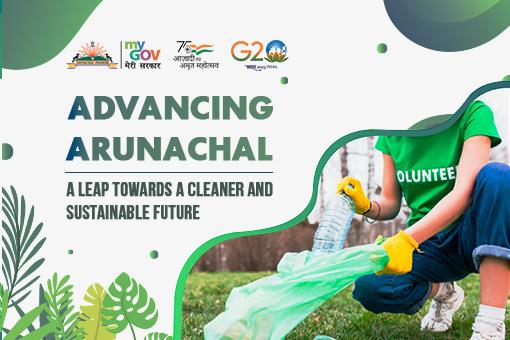Arunachal Pradesh in recent years, has been making remarkable strides in its journey towards progress and development. One of the key highlights of this advancement is the significant focus on enhancing solid waste management across major urban areas within the state. This proactive approach not only showcases Arunachal's commitment to a cleaner environment but also reflects its dedication to fostering sustainable growth.
One of the most commendable achievements on this front is the deployment of over 200 trucks and tippers dedicated to solid waste management. This strategic allocation of resources demonstrates the state's determination to address the pressing issue of waste accumulation effectively. By increasing the fleet for waste collection and transportation, Arunachal Pradesh as a progressive state has taken a vital step towards maintaining its urban areas in an organized and clean manner.
Another remarkable step is the substantial reduction in the solid waste collection and treatment gap. The state government's commitment to bridging this gap is indeed laudable, as it signifies a conscientious effort to align with global environmental standards. This reduction not only portrays Arunachal in a positive light but also serves as a testament to the administration's dedication to ensuring the well-being of its citizens and preserving the natural beauty of the state.
Equally noteworthy is the establishment of solid waste processing facilities and sewage treatment plants in key urban centers such as Itanagar and Pasighat. This forward-thinking approach underlines Arunachal's understanding of the importance of responsible waste management and its willingness to invest in the necessary infrastructure. These facilities are not just essential for the present, but they also lay the foundation for a more sustainable future by curbing pollution, promoting better hygiene, and safeguarding the state's unique ecosystem.
The state's commitment to embracing modern and sustainable solutions is paving the way for a cleaner, healthier, and more prosperous future. As Arunachal continues to make significant strides in waste management, it sets an inspiring example for other regions to follow suit, demonstrating that positive change is possible with dedication, vision, and responsible action.
Inviting citizens to share your ideas and feedback on how we can exemplify solid waste management in the state and make Arunachal Pradesh a clean and green region.













BrahmDevYadav 2 years 1 month ago
What is the role of the government in waste management?
(i) The check degradation of land and water through wasteland management and restorations of
river water quality programmes.
(ii) To make laws and acts for environment protection and to initiate penal measures against
those who violate these laws.
BrahmDevYadav 2 years 1 month ago
What is the government scheme to reduce the waste?
SWACHH BHARAT MISSION-URBAN 2.0:-
The objectives of the Mission were-Eradication of open defecation in all statutory towns; 100% scientific management of municipal solid waste in all statutory towns; and effecting behaviour change through Jan Andolan.
BrahmDevYadav 2 years 1 month ago
What is the government program to reduce waste?
In continuation of the Swachh Bharat Mission objective, The Waste to Wealth Mission has deployed a decentralized waste Processing technology park. This park includes technologies that segregate fresh Municipal solid waste.
BrahmDevYadav 2 years 1 month ago
What are the benefits of waste treatment?
There are many benefits to having a modern wastewater treatment system:-
1.Rids Potential Diseases:- Wastewater treatment systems eliminate disease-causing bacteria
and kill harmful organisms.
2.Low Cost.
3.Minimal Odour Emissions.
4.No Water Bills.
5.Little Maintenance.
6.Break Down Solids Faster.
7.Less Wasteful.
BrahmDevYadav 2 years 1 month ago
What are the factors affecting waste collection system?
Factors that influence the quantity of municipal wastes generated include:-
1.Geographic location.
2.Season of the year.
3.Collection frequency.
4.Use of kitchen waste grinders.
5.Characteristics of populace.
6.Extent of salvaging and recycling.
7.Public attitudes.
8.Legislation.
BrahmDevYadav 2 years 1 month ago
How to recycle waste?
1.Make sure it is clean.
2.Flatten cardboard.
3.Set up designated recycling containers at home, work and school.
4.Look for products made out of recycled materials when we shop.
5.Identify which types of plastic our building and neighbourhood will accept.
BrahmDevYadav 2 years 1 month ago
What should we reduce?
Reduce our food waste by shopping smart, buying what we need, composting food scraps and donating unused food to food banks or shelters. More ways to reduce your impact. Reuse or repurpose items such as old clothing, cloth grocery bags and containers to prevent waste.
BrahmDevYadav 2 years 1 month ago
What are the main objectives of waste management?
1.Minimize the Production of Waste.
2.Reduce Pollution Effects.
3.Protect Ground water Sources.
4.Ensure Sustainability.
BrahmDevYadav 2 years 1 month ago
How waste management is done in India?
Households are required to separate waste into three streams:–
1.Organic or Biodegradable waste,
2.Dry waste (such as plastic, paper, metal and wood),
3.Domestic Hazardous waste (diapers, napkins, mosquito repellents, cleaning agents).
BrahmDevYadav 2 years 1 month ago
What are the eight principles of solid waste management?
1· Rethink.
2. Refuse.
3. Reduce.
4. Reuse & recycle.
5. Repurpose.
6. Repair.
7. Compost.
8. Conclusion.